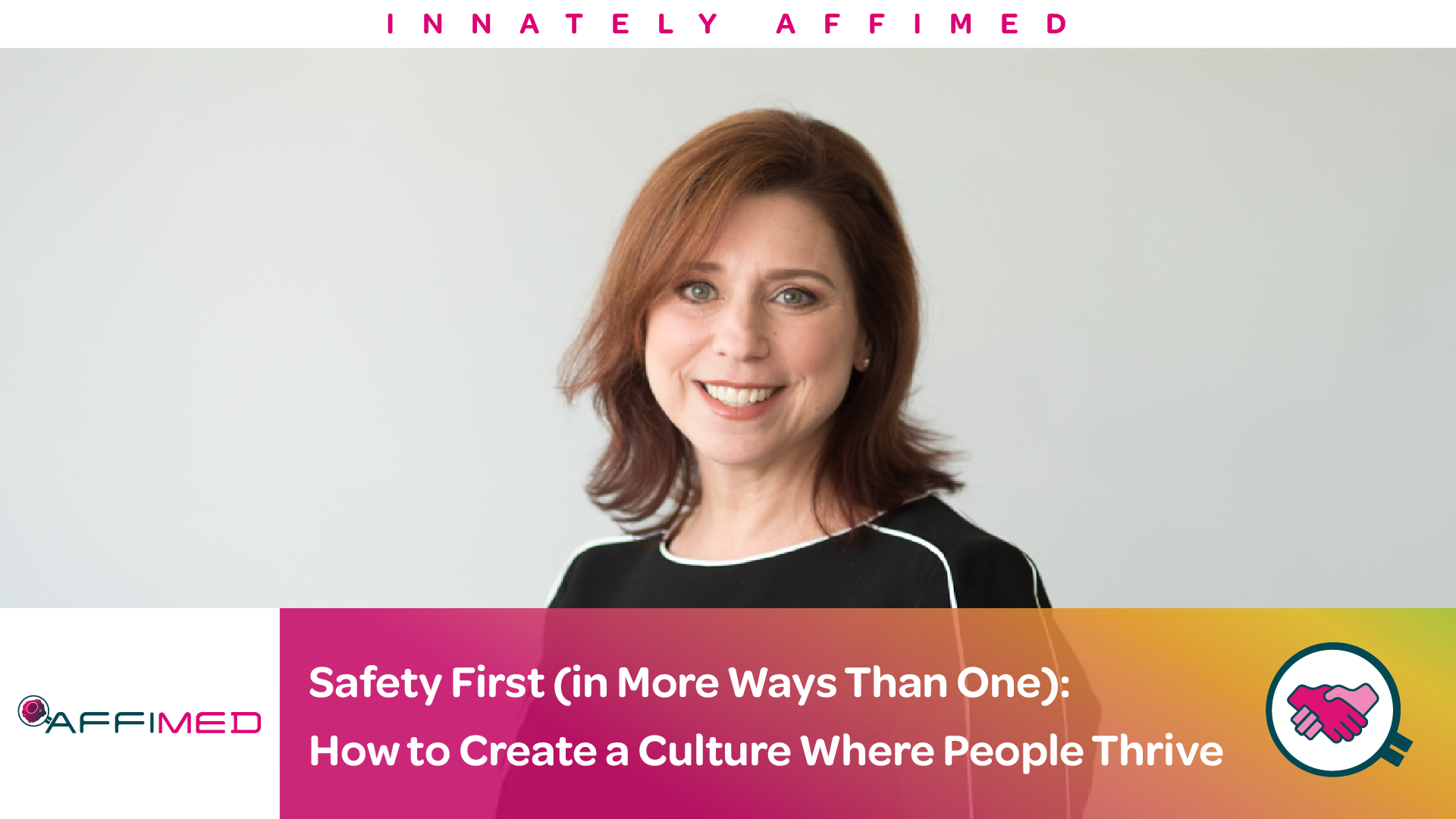
By Denise Mueller, CBO of Affimed
We’ve all heard about the economic trends brought on by the pandemic—from the Great Resignation to the economic recovery of the Great Reset to “Quiet Quitting,” whereby employees feeling burnout no longer choose to go above and beyond. Even as life is resetting, it seems like people are busier now than they were in pre-pandemic days. With little separation between work and home life, people are still struggling with burnout—regardless of the supposed resets. So how has the Affimed value of PEOPLE changed in this quasi-post-pandemic work world?
Two words: It hasn’t. If anything, we’re doubling down. I know I am.
A company or team is only as good as its people, so my priority has always been about creating a safe environment so that a diversity of thought, background and culture can thrive. Safety in the last couple of years has been focused on literally keeping people physically—in addition to psychologically—safe.
A psychologically safe environment is one where people can be human, meaning a space where people feel comfortable sharing what is happening with them—whether that is emotionally, professionally, or personally. I encourage people who work with me to let off steam if they need to. Sometimes, letting off steam is exactly what is needed to get to a solution or to simply get “unstuck.”
Being human is also not about being perfect. We all make mistakes regardless of our titles. I want people to come to me if they’ve made a mistake so it can become a learning opportunity and we can problem solve before it’s too late. This is how mistakes turn into renewable resources and sometimes a source of inspiration instead of just emotional trash, something you feel bad about and an experience you gain nothing from. My philosophy is that when there is nothing to hide, there are only possibilities to thrive. I model this by sharing my own mistakes, learnings, frustrations, and even personal life so that others feel safe to do the same. Just as my successes are their successes, my learnings are theirs as well. We help each other be better in all ways—as a team, as colleagues, as collaborators, and even at home. This not only creates a rich and meaningful environment, it creates a rich and meaningful life.
To put it simply, these are the tenets I live by:
1. We are only as strong as our relationships.
If the pandemic has shown us anything, it’s how important relationships are. I have always prioritized building meaningful relationships, which I do by taking the time to get to know people beyond work. I do this with authenticity by also letting people know about me, what I value, what’s going on in my life, who I am, and most importantly, when I need help—and yes, I do need help. I admit to not knowing everything, and I admit that sometimes I also experience feeling overwhelmed. This openness engenders trust.
Additionally, getting to know people outside of work is critical because if things are challenging at home, there will be challenges at work. I ask questions and listen actively so that I can find ways to support my team during the inevitably difficult times of family illness or childcare demands—which virtually no one is immune to. It is impossible to create a safe environment without this tangible expression of empathy. I have experienced this in my own life and remember sharing with our CEO and my team a very difficult time with one of my daughters. Everyone simply said, “You are Affimed family, and family takes care of each other. Do what you need to do and lean on us—we have your back.” This is understanding that people need a space to feel secure, and to be able to care for both their professional and personal needs is now more valuable than ever.
2. Empower people power.
Creating a safe environment that allows (and dare I say, enables) mistakes to happen is crucial. I am very up front with people that they are going to make mistakes and that I am going to let them. I don’t do this to be mean; I do this because growth doesn’t happen without these real-world mistakes. It provides an opportunity to collaborate on that growth. It creates a coaching moment filled with context. By allowing this organic course correction, trust is fostered, and people see that mistakes are not the end of the world—they sometimes open doors we had not seen or contemplated.
A Two-Way Street
Building a safe environment for people to thrive is also a learning experience. As a leader, I have seen that what works for one person won’t necessarily work for another. My overall leadership philosophy doesn’t change, but I can finesse its execution. This acknowledges the fact that different personalities need different things. It might not be innate or even comfortable for someone to share their personal or home life at work. It might not be easy to know that a mistake is going to happen to allow for a coachable moment.
Therefore, I view coaching as a two-way street. Just as I want to bring out the best in people, I need help to be my best. To do that, I ask for feedback and look for cues as to what’s working and what’s not. This ongoing process is a dynamic one and best of all, it’s very human. It places people first so we can all thrive regardless of circumstance.